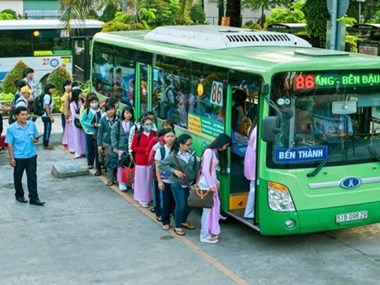 |
|
Buses at the Mien Tay (Western) Coach Station in HCM City’s Binh Tan District. — VNS Photo Nguyen Diep
|
According to the city People’s Committee Office, the Department of Transport has submitted a tentative plan for this.
The focus will be on developing the bus network.
The city will ensure there is no shortage of human resources so that public transport projects are completed on schedule, including a number of planned metro routes and a bus rapid transit (BRT) system.
By 2030, it expects to begin operation of the Thu Thiem-Long Thanh light rail to serve people travelling to the Long Thanh International Airport, which is scheduled for completion in a few years.
It will also consider other mass transport modes such as electric trams.
Inland waterway transport will be developed along with tourism.
A plan to regulate taxis in the inner city, including where they can pick up and drop off passengers, will be drafted.
The city plans to operate small buses with fewer than 17 seats to reduce congestion on the roads and ply easily along smaller streets, and build a network of bus stations.
It will solicit private investment in deploying public bicycles for rent and operating electric motorbikes and trams.
Authorities will consider earmarking dedicated lanes for public buses to ensure their punctuality.
Priority will be given to vehicles that use clean and environment-friendly fuels such as CNG, LPG and electricity.
The quality of human resources operating buses will be improved.
The management and operation of public transport systems will be modernised.
By 2025, smart cards are expected to be used on all bus routes and also on other public transport like the metro, river bus and public bicycle and electric motorbike services.
Cars entering the city centre are likely to have to pay toll.
The department in its letter also mentions solutions for urban planning and management, funding and use of information technology to support the development of public transport.
It will turn to detailed plans and means for funding after the draft plan is approved.
Around VND47.6 trillion ($2 billion) for the plan will come from public funding and the rest from private investors and ODA. VNS

HCM City to invest in public transport in new residential areas
The HCM City Department of Transport has asked the city's People’s Committee to outline plans for investment in public transport in new residential areas, including new bus lanes, in an aim to reduce traffic congestion.

HCM City encourages people to use public transport
Ho Chi Minh City has deployed a number of plans to increase the number of commuters using buses to 11.2 percent this years, up 1.6 percentage points from last year.
 HCM City plans to spend nearly VND400 trillion (US$17.3 billion) on improving public transport and limiting the use of personal vehicles during the next decade.
HCM City plans to spend nearly VND400 trillion (US$17.3 billion) on improving public transport and limiting the use of personal vehicles during the next decade.